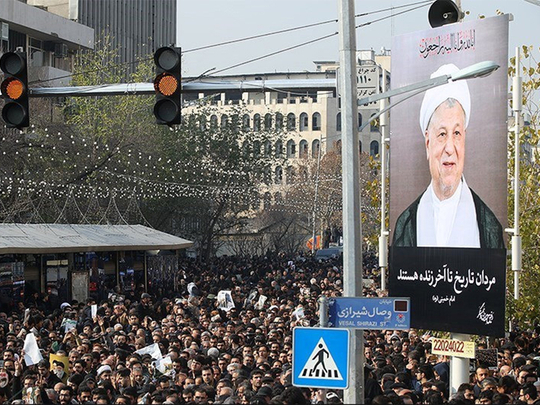
Beirut: Iran’s Revolutionary Guards look set to entrench their power and shift the country to more hardline, isolationist policies for years to come following the death of influential powerbroker Ali Akbar Hashemi Rafsanjani.
Former president Rafsanjani long had a contentious relationship with the Islamic Revolutionary Guard Corps (IRGC), which is both the strongest military force in Iran and also has vast economic interests worth billions of dollars.
With a presidential election in May and a question mark over the health of Iran’s most powerful figure, Supreme Leader Ayatollah Ali Khamenei, analysts say the Guards will soon have opportunities to tighten their grip on the levers of power.
Rafsanjani, who died last week, aged 82, had criticised the Guards’ expanding economic interests, which range from oil and gas to telecommunications and construction, their role in the crackdown on protests after disputed 2009 presidential elections and the country’s missile programme which the Guards oversee.
Rafsanjani was a high-profile member of the Assembly of Experts that selects the Supreme Leader. Though he favoured an easing of security restrictions on Iranians at home, opening up to the West politically and economically, he was a respected go-between who could balance the influence of hardliners.
During mourning ceremonies this week, senior Revolutionary Guards commanders appeared on state TV to praise Rafsanjani, a companion of the Islamic Republic’s founder Ayatollah Ruhollah Khomeini and one of the pillars of the 1979 Islamic Revolution.
But analysts say many are quietly celebrating the departure of one of their biggest domestic critics.
“They’re going to be very happy,” said Ali Ansari, director of the Institute of Iranian Studies at the University of St Andrews. “They’re shedding a lot of crocodile tears.”
With Rafsanjani out of the picture the Guards can lay a crucial role in determining who becomes the next Supreme Leader by steering Assembly members toward a candidate more sympathetic to their interests, analysts say.
“All of the candidates you hear about who could replace Khamenei are much more hardline and have more radical views,” said Mehdi Khalaji, a former seminarian from Qom who is a senior fellow at the Washington Institute for Near East Policy.
The hardline camp in Iran has defined itself by a deep distrust of Western governments and rigid opposition to internal political reform, whereas Rafsanjani was the leading force behind moderate President Hassan Rouhani’s election win.
The 2015 nuclear agreement between Iran and Western powers was also anathema to hardliners and they have often used the deal, and the economic openings it offered Western companies, to criticise Rouhani’s government.
The question of who could replace Khamenei, 77, was first raised in earnest when he was hospitalised in 2014.
State TV showed Khamenei, who became the Islamic Republic’s second Supreme Leader in 1989, in a hospital bed with a string of officials visiting.
Analysts said this was done to help the public recognise that a change at the top was inevitable.
In the event of Khamenei’s death, the Assembly of Experts’ 88 members will hold a closed-door session to push for the candidate of their choice before a final vote is taken. Analysts expect the Revolutionary Guards to play a significant role.
“They’ll be absolutely pivotal,” said Ansari.











